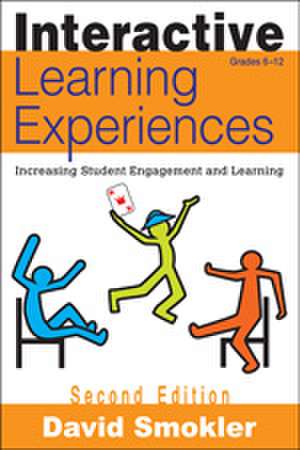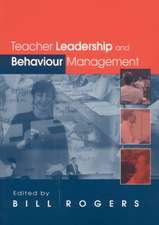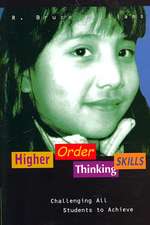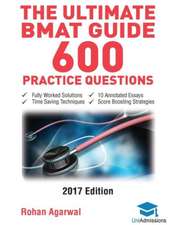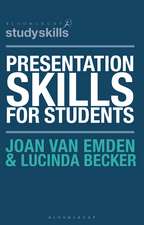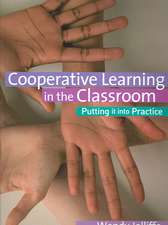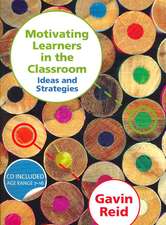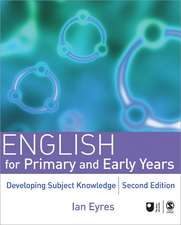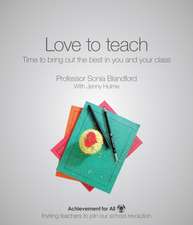Interactive Learning Experiences, Grades 6-12: Increasing Student Engagement and Learning
Autor David Samuel Smokleren Limba Engleză Paperback – 22 oct 2008
| Toate formatele și edițiile | Preț | Express |
|---|---|---|
| Paperback (1) | 217.08 lei 6-8 săpt. | |
| SAGE Publications – 22 oct 2008 | 217.08 lei 6-8 săpt. | |
| Hardback (1) | 434.15 lei 6-8 săpt. | |
| SAGE Publications – 4 noi 2008 | 434.15 lei 6-8 săpt. |
Preț: 217.08 lei
Nou
Puncte Express: 326
Preț estimativ în valută:
41.54€ • 43.13$ • 34.64£
41.54€ • 43.13$ • 34.64£
Carte tipărită la comandă
Livrare economică 22 martie-05 aprilie
Preluare comenzi: 021 569.72.76
Specificații
ISBN-13: 9781412963367
ISBN-10: 1412963362
Pagini: 168
Dimensiuni: 152 x 229 x 13 mm
Greutate: 0.27 kg
Ediția:Second Edition
Editura: SAGE Publications
Colecția Corwin
Locul publicării:Thousand Oaks, United States
ISBN-10: 1412963362
Pagini: 168
Dimensiuni: 152 x 229 x 13 mm
Greutate: 0.27 kg
Ediția:Second Edition
Editura: SAGE Publications
Colecția Corwin
Locul publicării:Thousand Oaks, United States
Recenzii
"This book will excite teachers who want to help motivate today’s secondary students. Information about the brain, presented along with the author’s personal teaching experiences, tips, and creative game ideas, makes for a very worthwhile read!"
"Makes teachers think about the purpose and connection that a game will have to the curriculum as well as to students’ lives. This book helps clarify the purpose of including meaningful experiential games in the classroom."
"Smokler passionately argues the need for games in the curriculum as a means to create authentic and meaningful learning experiences. Hands down, this is the best book I’ve read about the use of games in the classroom!"
"The book begins with the teenager’s brain. In layman's terms, it lets teachers know why teenagers are difficult to engage and how to create a classroom atmosphere that will hold their attention and allow them to learn."
"Gives teachers a variety of simulations and creative ideas they can try in their classrooms to help enhance and energize their teaching."
"Makes teachers think about the purpose and connection that a game will have to the curriculum as well as to students’ lives. This book helps clarify the purpose of including meaningful experiential games in the classroom."
"Smokler passionately argues the need for games in the curriculum as a means to create authentic and meaningful learning experiences. Hands down, this is the best book I’ve read about the use of games in the classroom!"
"The book begins with the teenager’s brain. In layman's terms, it lets teachers know why teenagers are difficult to engage and how to create a classroom atmosphere that will hold their attention and allow them to learn."
"Gives teachers a variety of simulations and creative ideas they can try in their classrooms to help enhance and energize their teaching."
Cuprins
Preface
Acknowledgments
About the Author
1. Why Create an Experience?
What Is an Experience?
Brain-Compatible Learning
Seeing Into the Brain
How the Brain Learns
Brain Research and Education: What Teachers Need to Know
Why Is It So Hard to Impress a Teenager?
Emotion: At the Center of the Brain
Complex Learning Activities
The Power of Reflection
Reflection Questions for Teachers
2. How to Create an Experience
Preparing a Classroom Environment Conducive to Experiences
Here's the Problem
Spread the Love: Rapport-Building Exercises
The Physical Environment
Strategies for Creating Experiences
What Does Infinity Smell Like?
Move Your Body
Using Music to Build Anticipation, Excitement, and Readiness
Tying Music to Your Curriculum
Fantasy Contexts
Putting It All Together: Creating Your Own Experiences
Student Involvement
Other Ideas for Experiences
Intrinsic vs. Extrinsic Motivation
Ideas for English and Social Studies Teachers
Ideas for Math and Science Teachers
Ideas for World Language Teachers
Ideas for Health, Wellness, and Physical Education Teachers
Reflection Questions for Teachers
3. How Do You Assess an Experience?
Traditional vs. Authentic Assessment
Reflection as Formative Assessment
Aligning Your Experiences to Standards
Why Standards-Based?
Reflection as Summative Assessment
Other Considerations
See What They Already Know Before You Begin
Reflection Questions for Teachers
4. Sample Experiences
Guess Who Had This for Dinner
The Eliminator
Morning Move-Around
The Wave
Two Truths and a Lie
The Name Game
Thumper
Old-Fashioned Sing Down
Musical Moment
The Reveal
Debate Shift-Around
Save the Princess
Counter-Terrorism
The Arrest
Shelter
The Scream
The Fire
Power
Island Survival
The Salesman
Witch Hunt
The Farm Game
Crime Scene
Rollercoaster Designer
5. Making Experiences Work for You
Resource A. Reproducible Handouts
Song Reflection Report
Save the Princess
Counter-Terrorism
The Scream
Power
Island Survival
The Salesman
The Farm Game
Crime Scene
Lab Report
Resource B. Additional Resources
Brain-Based Learning Fun Kit
Web Resources About Brain-Compatible Learning
Web Resources About Simulation Games
References
Index
Acknowledgments
About the Author
1. Why Create an Experience?
What Is an Experience?
Brain-Compatible Learning
Seeing Into the Brain
How the Brain Learns
Brain Research and Education: What Teachers Need to Know
Why Is It So Hard to Impress a Teenager?
Emotion: At the Center of the Brain
Complex Learning Activities
The Power of Reflection
Reflection Questions for Teachers
2. How to Create an Experience
Preparing a Classroom Environment Conducive to Experiences
Here's the Problem
Spread the Love: Rapport-Building Exercises
The Physical Environment
Strategies for Creating Experiences
What Does Infinity Smell Like?
Move Your Body
Using Music to Build Anticipation, Excitement, and Readiness
Tying Music to Your Curriculum
Fantasy Contexts
Putting It All Together: Creating Your Own Experiences
Student Involvement
Other Ideas for Experiences
Intrinsic vs. Extrinsic Motivation
Ideas for English and Social Studies Teachers
Ideas for Math and Science Teachers
Ideas for World Language Teachers
Ideas for Health, Wellness, and Physical Education Teachers
Reflection Questions for Teachers
3. How Do You Assess an Experience?
Traditional vs. Authentic Assessment
Reflection as Formative Assessment
Aligning Your Experiences to Standards
Why Standards-Based?
Reflection as Summative Assessment
Other Considerations
See What They Already Know Before You Begin
Reflection Questions for Teachers
4. Sample Experiences
Guess Who Had This for Dinner
The Eliminator
Morning Move-Around
The Wave
Two Truths and a Lie
The Name Game
Thumper
Old-Fashioned Sing Down
Musical Moment
The Reveal
Debate Shift-Around
Save the Princess
Counter-Terrorism
The Arrest
Shelter
The Scream
The Fire
Power
Island Survival
The Salesman
Witch Hunt
The Farm Game
Crime Scene
Rollercoaster Designer
5. Making Experiences Work for You
Resource A. Reproducible Handouts
Song Reflection Report
Save the Princess
Counter-Terrorism
The Scream
Power
Island Survival
The Salesman
The Farm Game
Crime Scene
Lab Report
Resource B. Additional Resources
Brain-Based Learning Fun Kit
Web Resources About Brain-Compatible Learning
Web Resources About Simulation Games
References
Index
Notă biografică
David Smokler currently teaches English in Needham, Massachusetts. Jobs for English teachers were nonexistent, so unable to get a traditional teaching gig, Smokler accepted a job teaching juvenile offenders on a horse-drawn, cross-country, covered wagon train. He planned lessons and taught literature and writing to more than fifty incarcerated students while traveling twenty to twenty-five miles a day on horse- and mule-drawn wagons from Pennsylvania to southwestern Texas. On the wagon train, Smokler began to develop some of the experiences in this book. After another year of teaching juvenile offenders in prison, Smokler moved to Cape Cod, where he taught for four years while completing his Master of Arts in Teaching English at Bridgewater State College, where he conducted original research on simulation games. Smokler graduated from Connecticut College in 1996 with a degree in English and with teaching credentials
Descriere
This book will excite teachers who want to help motivate today's secondary students. Information about the brain is presented along with the author's personal teaching experiences, tips, and creative game ideas.
